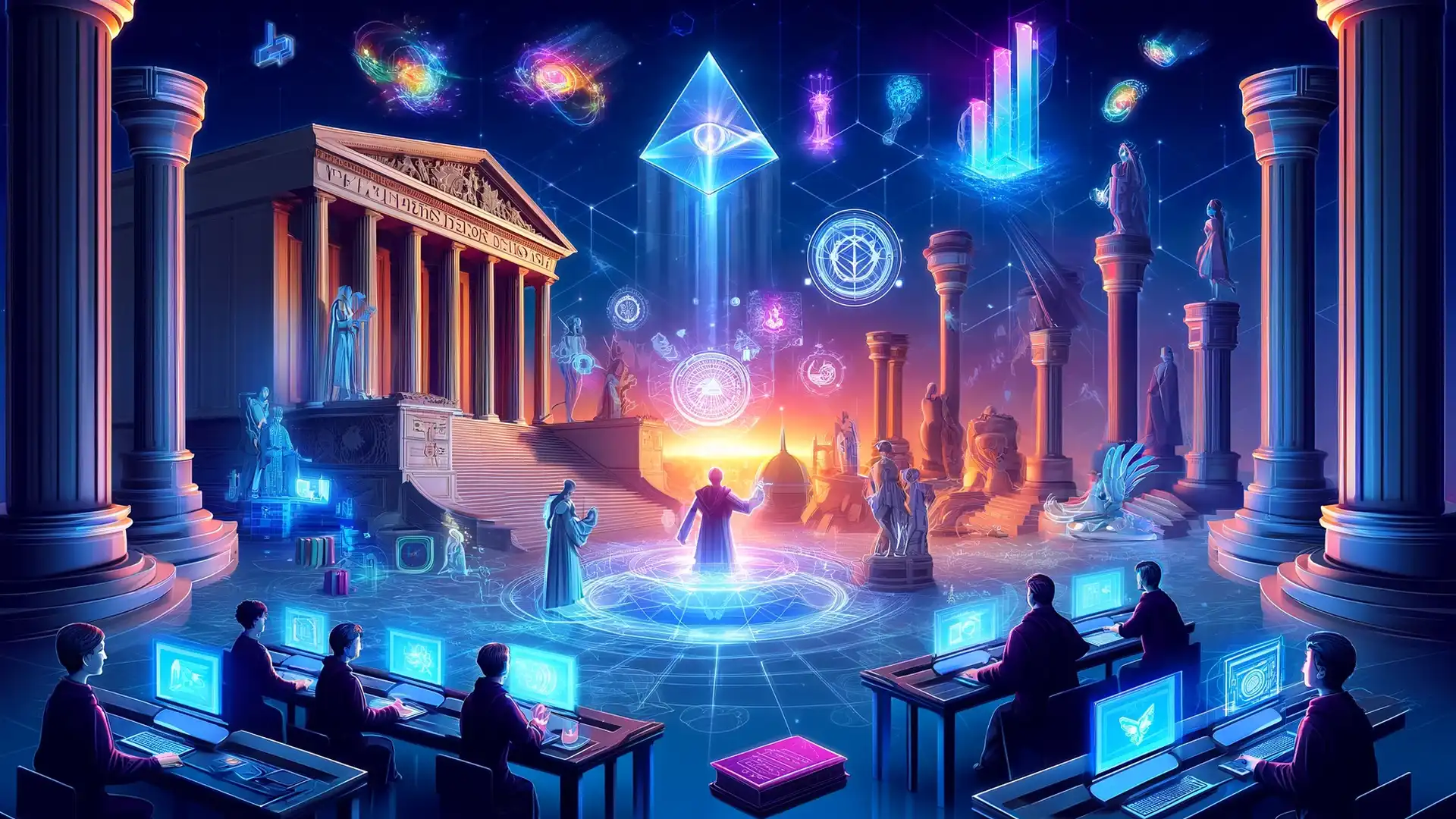NFT Credentials: Revolutionizing Online and Distance Learning

 Author:
Artem Grigoriev
Author:
Artem Grigoriev
Revolutionizing Online Learning: The Impact of NFT Credentials
In the ever-evolving world of online learning, NFT credentials are poised to revolutionize how educational achievements are verified and validated. These unique digital certificates confirm educational accomplishments. At their core, NFT credentials are digital assets meticulously verified using blockchain technology . This technology records information across multiple computers, making it nearly impossible to alter or hack.
📘 This article complements: "The Complete Guide to NFT Credentials". Explore it to find answers to all your questions;)
This chapter delves into how these innovative credentials enhance online education, making it more secure, trustworthy, and efficient.
Imagine completing an online course and receiving a credential permanently recorded on a blockchain. This credential cannot be changed or duplicated, ensuring authenticity and integrity. For students, this means their hard-earned achievements are secure and easily verifiable by employers or academic institutions.
Blockchain’s decentralized nature means no single entity controls the data. This eliminates the need for a central authority and significantly reduces the risk of fraud. According to a report by IBM , blockchain's immutability and transparency are key factors that increase trust and security in digital credentials, making them trustworthy and universally recognized. This boosts confidence across the entire educational system.
Doubts about online certifications often stem from their perceived ease of forgery and the lack of central verification. NFT credentials effectively address these issues. Each credential is backed by a blockchain, creating a permanent, verifiable record that instills confidence in employers and academic institutions.
This significant change addresses a major challenge in online education, building credibility and trust. A study by the World Economic Forum shows that blockchain can greatly reduce credential fraud, enhancing the credibility of online learning platforms. Additionally, the transparency provided by blockchain ensures that the entire verification process is open and accessible, further increasing trust in these credentials.
One practical benefit of NFT credentials is the simplified process for admissions and transfers . Students often face numerous administrative challenges when transferring credits or verifying previous coursework. With a digital, verifiable record, these processes become much simpler and more efficient. Institutions can quickly and accurately verify a student’s credentials, reducing delays and administrative burdens.
💡 Note: NFT credentials ensure privacy and control over personal data. Stored on a decentralized network, these credentials allow students to decide who can access their information. This greatly enhances privacy and security, giving students peace of mind about their personal information in an age where data breaches and privacy concerns are widespread.

This system supports personalized learning paths by allowing students to present a comprehensive, verifiable portfolio of their skills and accomplishments. This portfolio can then be used to tailor educational experiences to their unique needs and career goals. Research by the American Council on Education shows that digital credentials can greatly simplify credit transfer and admissions processes. Additionally, the reduction in administrative overhead translates to cost savings for educational institutions, allowing them to reallocate resources to other critical areas.
Moreover, NFT credentials increase access to global educational opportunities . By standardizing the verification process, students worldwide can have their achievements recognized internationally. This opens up new possibilities for learners, especially those in remote or underrepresented regions. This is a significant step toward making education more accessible to everyone, breaking down geographical barriers and providing equal opportunities for all.
A report from the United Nations Educational, Scientific and Cultural Organization (UNESCO) discusses how blockchain technology can democratize access to education, providing a universal platform for credential verification. This universal platform can bridge educational gaps and foster global collaboration, ultimately leading to a more interconnected and educated world.
Another significant advantage of NFT credentials is their strong support for lifelong learning and continuous professional development . Individuals can accumulate a wide range of skills and knowledge over their lifetime and seamlessly integrate these credentials into their professional and academic portfolios. This continuous, verifiable record supports career growth and aids adaptability in a rapidly changing job market. According to a Harvard Business Review article , blockchain-based credentials support lifelong learning by providing a secure and portable record of professional development. This flexibility is crucial in today’s dynamic job market, where new skills and competencies are constantly needed.
As we look to the future of education, it’s clear that NFT credentials offer numerous benefits. These include enhanced security and credibility, streamlined processes, and global recognition. They pave the way for a more secure, efficient, and accessible educational system. These credentials represent a major change in how educational achievements are recognized and validated, setting a new standard for academic and professional excellence.
💡 Tip: When adopting NFT credentials, consider the technological infrastructure and legal frameworks in place. This ensures a smooth transition and effective implementation. Proper planning and adherence to regulatory requirements help maximize the benefits, ensuring widespread acceptance and trust in these innovative credentials.

Practical Applications and Future Trends of NFT Credentials in Education
Imagine receiving a diploma that is not just a piece of paper but a unique digital asset securely stored on a blockchain . This revolutionary system records information in a manner that is extremely difficult or nearly impossible to alter, hack, or manipulate. This groundbreaking reality is already being implemented by prestigious institutions like the Massachusetts Institute of Technology (MIT) . MIT has pioneered the issuance of blockchain-based digital diplomas.
These NFT credentials are unique digital certificates that verify ownership of something stored on the blockchain. They offer enhanced security and ease of verification, transforming the traditional credentialing process. According to a report by MIT News , blockchain technology guarantees the permanence and authenticity of digital diplomas. Once recorded on the blockchain, a diploma cannot be altered. This makes these credentials not only more reliable but also universally accessible, fostering trust and efficiency within the educational ecosystem.
Case Studies provide concrete insights into how NFT credentials benefit both institutions and learners. Universities issuing NFT diplomas to graduates ensure that their achievements are permanently and securely recorded. Online course providers also leverage NFT certificates for completed courses, making it easier for students to confidently prove their qualifications.
These examples highlight the practical advantages of NFT credentials, including:
- Enhanced security
- Reduced fraud (less risk of fake degrees)
- Streamlined verification processes
The Blockchain Education Alliance has documented numerous successful implementations of blockchain in education, showcasing tangible benefits for both institutions and students. Additionally, these case studies underscore how NFT credentials can improve administrative efficiency. They reduce costs associated with credential verification, freeing up resources for other educational priorities.
One of the key benefits of NFT credentials is their robust support for student privacy . Blockchain technology ensures that data is stored in a decentralized and secure manner, meaning the information is spread across many computers, making it much harder for anyone to tamper with it. Unlike traditional credentials, which can be easily forged or require third-party verification, NFT credentials are inherently secure and verifiable through the blockchain.
Students' achievements are protected and easily accessible, offering a significant advantage in terms of security and authenticity. A study by EDUCAUSE emphasizes the crucial role of blockchain in enhancing data privacy and security in educational credentials. Furthermore, this decentralized approach empowers students to control their personal data, ensuring it is only shared with authorized parties. This adds an extra layer of privacy and security, giving students more control over who can see their credentials.
However, challenges and limitations of NFT credentials must be carefully considered. Implementing blockchain infrastructure can be costly, and there is a need for widespread acceptance and recognition of NFT credentials. Technical barriers, such as the need for robust digital infrastructure and expertise in blockchain technology, can also pose challenges for both institutions and learners.
💡 Note: Partnerships between educational institutions and blockchain technology providers are crucial for overcoming challenges. They promote the effective adoption of NFT credentials. Collaboration drives innovation, addresses technical and regulatory barriers, and ensures the successful integration of NFT credentials into the education system.

Despite these hurdles, ongoing efforts are being made to overcome them. Partnerships between educational institutions and blockchain technology providers are crucial in addressing these challenges and promoting the widespread adoption of NFT credentials. The European Commission has initiated projects to support blockchain adoption in education, addressing both technical and regulatory challenges. Additionally, these partnerships can facilitate the development of standardized protocols to ensure interoperability and seamless integration of NFT credentials across different platforms. This means NFT credentials from different institutions can be easily verified and accepted anywhere in the world.
Looking ahead, future trends in NFT-based learning and credentials are incredibly promising. The integration of smart contracts with NFT credentials could automate various processes, including awarding credits for completed courses or verifying prerequisite knowledge for advanced classes. Smart contracts are self-executing contracts where the terms are directly written into code, potentially revolutionizing how educational institutions operate by making processes more efficient and transparent.
Additionally, employers are beginning to recognize the immense value of NFT credentials as verifiable, tamper-proof records. These provide a trustworthy representation of a candidate's skills and achievements. A Harvard Business Review article discusses how smart contracts could transform educational administration and credentialing. This integration could also facilitate continuous learning, automatically updating a student's credentials as they acquire new skills and knowledge. Imagine having a digital resume that updates itself as you complete new courses and gain new skills.
Educators' perspectives on integrating NFT credentials into curricula are evolving rapidly. Teachers and academic administrators are adapting to this new technology, developing innovative teaching approaches and creating NFT-based assignments. They also incorporate blockchain literacy into their curricula. This significant shift prepares students for a future where digital credentials are the norm.
Similarly, employers value NFT credentials for their ability to provide accurate and trustworthy representations of a candidate's qualifications, enhancing the hiring process. The World Economic Forum highlights the importance of blockchain literacy in modern education. Educators are also exploring how NFT credentials can support personalized learning experiences, tailoring educational content to meet the unique needs and goals of each student. This could lead to more customized education paths that better fit each student's career aspirations.
The financial implications of NFT credentials are also significant. For educational institutions, the initial investment in blockchain infrastructure can lead to long-term savings in administrative costs and enhance their reputation for adopting cutting-edge technology. For learners, the reduced risk of credential fraud and the increased ease of sharing and verifying their achievements can lead to better job prospects and career advancement.
Research by Deloitte indicates that blockchain can offer significant cost savings and efficiency gains for educational institutions. Moreover, the potential for global recognition of NFT credentials can enhance the employability of graduates, providing them with a competitive edge in the job market. Graduates from institutions using NFT credentials may find it easier to secure employment, as employers will trust the authenticity of their qualifications.
Finally, this chapter provides practical guidance on obtaining and using NFT credentials. Students can claim their NFT credentials by following specific steps to securely store and share these digital assets. Educational institutions can implement NFT credential systems effectively. Resources for further learning and support are highlighted, including online forums, tutorials, and blockchain-focused educational organizations. These resources help students and institutions navigate the complexities of adopting and utilizing NFT credentials effectively.
As NFT credentials continue to evolve, they are poised to have a profound impact on the education landscape. By examining real-world applications, addressing challenges, exploring future trends, and offering practical guidance, this chapter ensures readers are well-equipped to understand and utilize NFT credentials in their educational and professional journeys.
💡 Tip: Students and institutions should stay informed about the latest developments in NFT credentials and blockchain technology. This helps them leverage these innovations effectively for educational and career advancement. Keeping abreast of new research, technological advancements, and best practices will ensure they can maximize the benefits of NFT credentials.

Building Communities and Networking: Opportunities Opened by NFT Credentials
Building Trust with NFT Credentials: How It Works
NFT Credentials in Informal Education: Exploring New Horizons of Accreditation
NFT Credentials in Experiential Learning and Internships
Synergy in Collaborative Projects Through NFT Credentials
